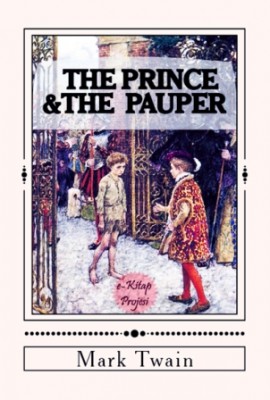By night, it was again a sight to see, with its great bonfires at every corner, and its troops of revellers making merry around them. There was no talk in all England but of the new baby, Edward Tudor, Prince of Wales, who lay lapped in silks and satins, unconscious of all this fuss, and not knowing that great lords and ladies were tending him and watching over him—and not caring, either. But there was no talk about the other baby, Tom Canty, lapped in his poor rags, except among the family of paupers whom he had just come to trouble with his presence.
London was fifteen hundred years old, and was a great town—for that day. It had a hundred thousand inhabitants—some think double as many. The streets were very narrow, and crooked, and dirty, especially in the part where Tom Canty lived, which was not far from London Bridge. The houses were of wood, with the second story projecting over the first, and the third sticking its elbows out beyond the second. The higher the houses grew, the broader they grew. They were skeletons of strong criss-cross beams, with solid material between, coated with plas-ter. The beams were painted red or blue or black, according to the owner's taste, and this gave the houses a very picturesque look. The windows were small, glazed with little diamond-shaped panes, and they opened outward, on hinges, like doors.
The house which Tom's father lived in was up a foul little pocket called Offal Court, out of Pudding Lane. It was small, decayed, and rickety, but it was packed full of wretchedly poor families. Canty's tribe occupied a room on the third floor. The mother and father had a sort of bedstead in the corner; but Tom, his grandmother, and his two sisters, Bet and Nan, were not restricted—they had all the floor to themselves, and might sleep where they chose. There were the remains of a blanket or two, and some bundles of ancient and dirty straw, but these could not rightly be called beds, for they were not organised; they were kicked into a general pile, mornings, and selections made from the mass at night, for service.
Bet and Nan were fifteen years old—twins. They were good-hearted girls, unclean, clothed in rags, and profoundly ignorant. Their mother was like them. But the father and the grandmother were a couple of fiends. They got drunk whenever they could; then they fought each other or anybody else who came in the way; they cursed and swore always, drunk or sober; John Canty was a thief, and his mother a beggar. They made beggars of the children, but failed to make thieves of them. Among, but not of, the dreadful rabble that inhabited the house, was a good old priest whom the King had turned out of house and home with a pension of a few farthings, and he used to get the children aside and teach them right ways secretly. Father Andrew also taught Tom a little Latin, and how to read and write; and would have done the same with the girls, but they were afraid of the jeers of their friends, who could not have endured such a queer accomplishment in them.

































